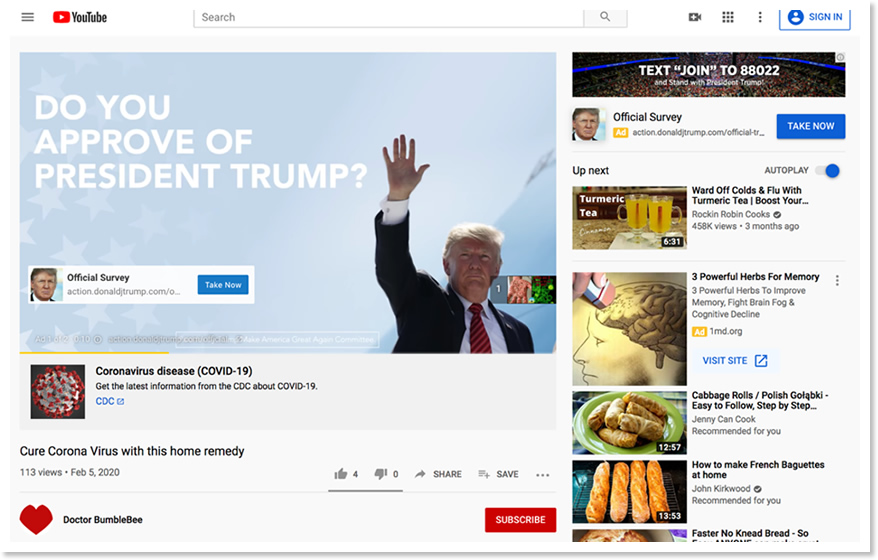Tech Transparency Project accuses YouTube of monetizing misleading COVID-19 videos
- Monday, April 6th, 2020
- Share this article:
 Campaign for Accountability (CfA), a non-profit watchdog group that runs the Tech Transparency Project (TTP), has accused YouTube of running ads on several videos that contain misleading information about COVID-19.
Campaign for Accountability (CfA), a non-profit watchdog group that runs the Tech Transparency Project (TTP), has accused YouTube of running ads on several videos that contain misleading information about COVID-19.
TTP said its investigation uncovered monetized videos touting “cures” and “protections,” including fruit-based home remedies and meditative music, among others, despite the platform’s insistence that videos containing misleading information about the virus are ineligible for monetization. Notably, the ads found alongside these videos were sponsored by well-known entities including President Donald Trump’s re-election campaign, Facebook, Liberty Mutual Insurance, and streaming startup Quibi.
When the coronavirus began to spread, YouTube prohibited ads on all videos regarding the epidemic, adhering to its “sensitive events” policy. This longstanding directive states that videos about certain events, including global health crises, are ineligible for ad revenue. On March 11, however, YouTube announced that it would exempt videos from certain news partners and self-certifying users to ensure creators could upload “quality videos in a sustainable way.”
TTP, however, found several monetized videos promoting misinformation. One video, entitled “Cure Corona Virus with this home remedy,” walks viewers through the process of making a blended shake using only lime, cucumber, and Aloe vera. Another, labelled “Koronawirus, jak prze?y? CoronaVirus, how to survive,” is a Polish-language video that advises viewers to avoid Chinese restaurants in order to protect themselves from the virus. A third, whose title begins, “CORONAVIRUS: Naturally Boost Your Immune System NOW!…” is an hour-long recording of meditative music. According to TTP, YouTube removed most of the videos in question after a reporter from The Guardian, who had been given access to the findings by TTP, shared them with YouTube for comment.
A report in the Guardian states that YouTube removed four of the videos in question for violating its policies against Covid-19 misinformation, while another three were left on the site as they were not promoting misinformation directly but offering wellness tips, according to a spokesman.
The same spokesman told the Guardian that YouTube had removed thousands of videos related to misleading and dangerous coronavirus content in recent weeks.
TTP said it’s unclear whether the videos in question passed through YouTube’s “self-certification” program successfully, or circumvented the program altogether, but noted that they clearly do not comply with the platform’s policy prohibiting ads for videos that contain false information.
“It has long been known that YouTube is a cesspool of misinformation, but it is now clear that, at the height of a global health crisis, YouTube is making money from videos that contain misleading claims,” said CfA executive director, Daniel Stevens. “YouTube’s pledge to emphasize truthful videos about the coronavirus is nothing but a Potemkin promise. The public should be alarmed that YouTube is continuing to make money from the spread of misinformation during this difficult period.”
We have asked Google for their reaction to TTPs claims.
Update:
Heres the response we received from a Google spokesman:
“We have clear policies against COVID-19 misinformation and we quickly remove content violating our policies when flagged to us. Upon a thorough review by our team, we removed four of the videos shared with us for violating our policies. Three of the videos however are just offering general meditation and wellness tips and do not violate policies. We’re committed to providing timely and helpful information at this critical time, including raising authoritative content, reducing the spread of harmful misinformation and showing information panels, using WHO [World Health Organisation] data, to help combat misinformation. We also have strict policies that govern what kind of videos we allow ads to appear on and we enforce these advertising policies vigorously.”
















